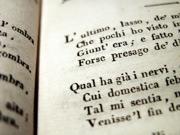But there are other kinds of reading. No one can race through a poem by Emily Dickinson or a short story by James Joyce and take away very much from the experience. Therein lies a problem for students reading literary works. On the one hand, there’s the impulse to get through an assignment, to knock off a poem or story and move on to another task. On the other hand, there’s the poem or story, the kind of text that invites and rewards patient attention. My advice: slow down. Here’s what the poet Ezra Pound says about reading literature: “no reader ever read anything the first time he saw it.” Or consider this exchange between Oprah Winfrey and the novelist Toni Morrison: “Do people tell you they have to keep going over the words sometimes?” “That, my dear, is called reading.” Or as the poet William Carlos Williams says in the poem “January Morning,” And here’s the novelist Zadie Smith, in an interview, likening the reader of literature to a musician learning a piece of music, Taking the time to slow down — marking a passage, pondering a detail, looking up a word, writing down a question, changing your mind, looking at the page in a way that allows you to begin to notice what’s there — might change, for keeps, your idea of what it means to read literature. Slowing down will also help you begin to understand how it is that some people seem to see so much in what they’re reading. They know that reading well sometimes means taking your time. Michael Leddy teaches college English and blogs at Orange Crate Art.
